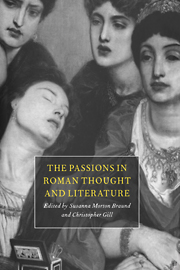Book contents
- Frontmatter
- Contents
- Preface
- Conventions
- Introduction
- 1 Epicurean anger
- 2 Cicero and the expression of grief
- 3 The subjugation of grief in Seneca's Epistles
- 4 A passion unconsoled? Grief and anger in Juvenal Satire 13
- 5 Passion, reason and knowledge in Seneca's tragedies
- 6 Imagination and the arousal of the emotions in Greco-Roman rhetoric
- 7 Pity, fear and the historical audience: Tacitus on the fall of Vitellius
- 8 All in the mind: sickness in Catullus 76
- 9 Ferox uirtus: anger in Virgil's Aeneid
- 10 ‘Envy and fear the begetter of hate’: Statius' Thebaid and the genesis of hatred
- 11 Passion as madness in Roman poetry
- Bibliography
- Index of ancient passages
- General index
6 - Imagination and the arousal of the emotions in Greco-Roman rhetoric
Published online by Cambridge University Press: 18 December 2009
- Frontmatter
- Contents
- Preface
- Conventions
- Introduction
- 1 Epicurean anger
- 2 Cicero and the expression of grief
- 3 The subjugation of grief in Seneca's Epistles
- 4 A passion unconsoled? Grief and anger in Juvenal Satire 13
- 5 Passion, reason and knowledge in Seneca's tragedies
- 6 Imagination and the arousal of the emotions in Greco-Roman rhetoric
- 7 Pity, fear and the historical audience: Tacitus on the fall of Vitellius
- 8 All in the mind: sickness in Catullus 76
- 9 Ferox uirtus: anger in Virgil's Aeneid
- 10 ‘Envy and fear the begetter of hate’: Statius' Thebaid and the genesis of hatred
- 11 Passion as madness in Roman poetry
- Bibliography
- Index of ancient passages
- General index
Summary
The ability to arouse the emotions of an audience was vital to the ancient orator. To achieve persuasion, he had to be able to move his audience as well as convince them by reasoned argument. In this chapter, I take up one specific strand in Greco-Roman thinking on this subject: the use of ‘Vivid illustration’ or ‘imagination’ (enargeia or phantasia) to make the audience ‘see’ situations in their minds and respond accordingly. This topic is handled in the treatises of writers such as Quintilian, Longinus and Menander Rhetor in a way that presupposes a background of philosophical psychology as well as of rhetorical method. Moreover, the authors of these treatises were themselves readers. Their precepts are based on their knowledge of the practice of earlier orators and, most significantly for the present discussion, they occasionally reveal their own emotional responses to the compositions of others. What emerges both from these autobiographical comments and from their statements about the device of enargeia is the presumption that the emotional responses of a reader or audience are highly predictable. This assumption is also clearly present in the typology of emotional responses, and of kinds of audience, in Aristotle's Rhetoric 2, a discussion that contains much that is relevant to the understanding of the social and cultural background to ancient rhetoric. The Romantic idea that the powerof imagination on the part of the author and of the responding reader should be regarded as free, unlimited and unpredictable does not figure as part of this strand of ancient thought; and this fact, in itself, is relevant to the larger project of this volume, the understanding of the emotions in the ancient world.
- Type
- Chapter
- Information
- The Passions in Roman Thought and Literature , pp. 112 - 127Publisher: Cambridge University PressPrint publication year: 1997
- 26
- Cited by

